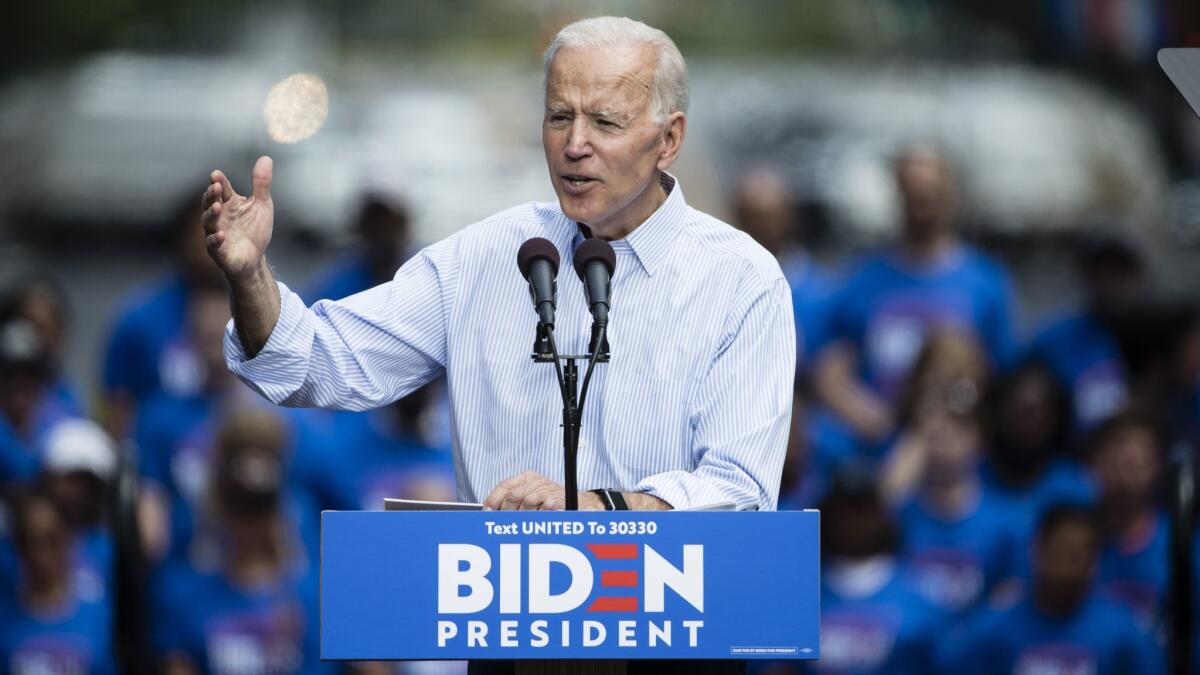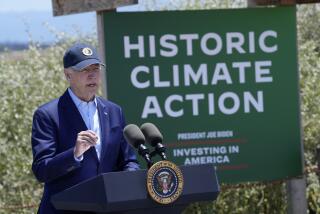Biden and Warren propose ambitious plans on climate change, reflecting Democratic urgency

Reporting from Washington — If Joe Biden had been inclined to take a middle-of-the-road approach toward climate change, he’s abandoned it, judging by the proposal he unveiled Tuesday — an aggressive $1.7-trillion, 10-year plan to combat warming that goes considerably further than the environmental agenda of the Obama White House.
Climate change got relatively little attention in the 2016 campaign. By contrast, this year, there is almost a race by Democratic candidates to outdo one another in environmental ambition.
Washington Gov. Jay Inslee argues that climate action must take precedence over everything else and has styled himself as the climate candidate. He calls for the U.S. to have an economy running 100% on renewable energy by 2035. Beto O’Rourke, trying to regain some forward motion in a seemingly stalled campaign, turned hard to climate action and swore off any fossil-fuel related campaign money after activists took note of all the oil industry workers who have donated to him.
Vermont Sen. Bernie Sanders echoed the sentiment of many in the party at last weekend’s California Democratic Party convention when he declared that “we have got to make it clear that when the future of the planet is at stake, there is no ‘middle ground.’” The remark was a shot at Biden after a campaign aide to the former vice president suggested to Reuters last month that a middle ground on climate was exactly what Biden sought.
No one in the Biden campaign is saying that now.
In joining the scrum of prominent 2020 hopefuls who have made far-reaching climate action a central focus of their campaign, Biden, the front-runner for the party’s nomination, proposed cutting emissions of greenhouse gases to zero by 2050, a goal set out in the Green New Deal, the policy framework championed by the most progressive Democrats.
He proposed getting to that goal with an agenda that includes far-reaching and potentially economically disruptive “enforcement mechanisms” on industry, as well as trade penalties for other countries that cheat on climate commitments. And he proposed raising corporate taxes to help pay for the program.
Biden’s plan also nods to one of his signature personal and political causes — Amtrak. It includes a call to “spark the second great railroad revolution” by reinvesting in California’s high-speed rail project, doubling the speed of existing fast trains in the Northeast, and ultimately expanding the network of such rail nationwide.
“We should become the innovative place in the world for the change that has to take place if we are going to survive,” Biden said at a campaign stop in Berlin, N.H.
The ambition and scope of his blueprint rival those of candidates to his left, including a plan presented Tuesday by Sen. Elizabeth Warren of Massachusetts, who proposes to spend $2 trillion over 10 years to speed the transition to a clean-energy economy and trigger a “green manufacturing boom.”
She would pay for the plan with a previously unveiled tax on corporate profits over $100 million. She embraces a 2050 zero-emissions goal globally but says projected U.S. emissions would have to be cut to zero by 2030 to meet that goal.
“I’m betting on American science,” Warren said at a campaign stop in Detroit. “I’m betting on American ingenuity. I’m betting on American workers to get us to a point where we can fight back against climate change and save this planet.”
The flood of plans reflects the urgency with which Democratic voters now consider an issue that long has been an afterthought in presidential elections.
President Trump’s abandonment of the Paris agreement on climate change and his dismantling of Obama-era climate protections — coupled with stepped-up warnings from scientists worldwide that time to address warming is fast running out — has galvanized the Democratic Party around climate. More than 90% of Democrats support the Green New Deal, according to a poll released last month by the Yale Program on Climate Change Communication. Six in 10 voters overall are now worried about global warming.
Most of the proposals the 2020 hopefuls have unveiled would reinstate the aggressive fuel mileage standards that Trump scrapped over the fierce objections and legal threats of California, reorient federal agencies toward climate action, and restore strict limits on methane pollution abandoned by Trump.
“Everyone is tripping over each other to be greener than the next guy,” said David Victor, a professor of international relations at UC San Diego and contributor to the United Nations Intergovernmental Panel on Climate Change.
The Sunrise Movement, an advocacy group pressuring 2020 hopefuls to back the Green New Deal, declared the Biden plan “a huge win,” even as it joined other progressive groups in vowing to push the former vice president to go further.
The Biden plan still includes some signature centrist components, such as embracing nuclear energy as one way of weaning the economy off oil, coal and other fossil fuels. It also calls for investment in “carbon sequestration” — technology that sucks greenhouse gases from the air and repurposes or buries them — an approach many environmentalists warn will slow the transition away from fossil fuels.
The inclusion of those elements concerned Niklas Hohne, an author of studies for the U.N. panel and co-founder of NewClimate Institute, a German think tank. But, like Sunrise, he said the Biden plan would take the U.S. far down the field toward meeting the global climate commitments Trump disavowed.
“Joe Biden’s climate plan is definitely ambitious,” he said. “The corner piece of achieving net zero emissions no later than 2050 is an ambitious goal, in particular if implemented through milestones with an enforcement mechanism.” Hohne says such mechanisms have proven key in countries that are succeeding in making serious progress toward the climate goals agreed to in Paris.
Biden’s plan calls for an enforcement mechanism to be passed by Congress and enacted by 2025. It would be based on the principle that “polluters must bear the full cost of the carbon pollution they are emitting,” according to the campaign.
“Our economy must achieve ambitious reductions in emissions economy-wide instead of having just a few sectors carry the burden of change,” the Biden plan says.
The plan leaves open the possibility that the goals could be enforced by using a carbon tax, which many economists see as the most efficient way to transform the economy from one based heavily on fossil fuels to one powered by renewable sources.
“The plan nowhere explicitly says carbon tax, cap and trade, carbon pricing — the things economists like myself would say are absolutely essential to achieving these reductions,” said Robert Stavins, a professor of energy and economic development at Harvard University. “It sounds like that is what he is referring to, but it has become too politically dangerous for them to say it.”
Biden’s more progressive rivals also avoid such language in their plans.
Even so, the Biden proposal, like the others, would almost certainly be met with a hostile reception in a Senate that has a strong chance of remaining under GOP control after the 2020 elections.
That has led some to argue that many of the climate goals set by the candidates could be achieved by toughening the existing regulatory system without the politically debilitating fight over imposing a broad new tax.
It is not just Congress that could prove a tough hurdle in implementing any of the plans. The U.S. would also need to nudge the rest of the world along, and reclaiming America’s place as a leader in climate action could prove extremely difficult after Trump abandoned that role.
Even as Biden vowed to leverage his deep experience in foreign affairs to reestablish the alliances, experts warned the toolbox available to him or any Democratic president would be limited.
“Our credibility on this problem has eroded because of the flakiness of the White House,” said UC San Diego’s Victor. “How do we get China to participate with us now? None of these plans really say.”
Times staff writer Seema Mehta in Detroit contributed to this report.
More stories from Janet Hook »
More to Read
Get the L.A. Times Politics newsletter
Deeply reported insights into legislation, politics and policy from Sacramento, Washington and beyond. In your inbox three times per week.
You may occasionally receive promotional content from the Los Angeles Times.












